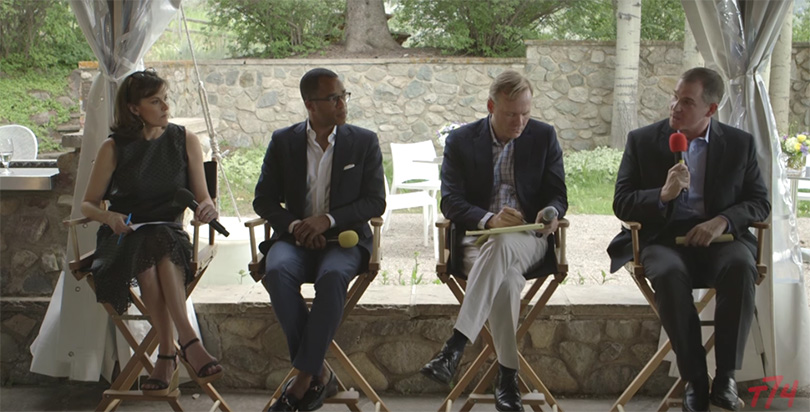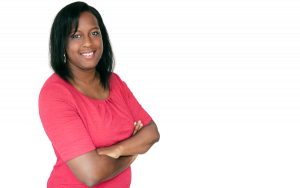Editor-in-chief Campbell Brown sits down with Frank Bruni, Jonathan Capehart and John Dickerson to discuss America’s education policies, and how they might shape the next presidential election
In 2004, President George W Bush defended the war on terror in a restructured world order; in 2008, Senator Barack Obama pitched us hope and change from the depths of an economic recession. Presidential elections have a way of both unearthing Americans’ innermost worries and projecting a more hopeful path forward.
So it is this election cycle. Amid rising concerns about income disparity, economic opportunity and racial equality, some pundits are wondering whether 2016 might finally be the year that the urgent issue of public education gets more than mere lip service from the national candidates.


At a recent gathering of America’s top political journalists who came together to discuss the politics of education in the upcoming presidential race, the consensus was that the answer hinges on who will win the nomination in a field already clogged with 15 candidates on the GOP side. There are five Democrats running so far.
“I think you are going to hear more about it this election than any election in recent memory,” said New York Times columnist Frank Bruni, adding that economic inequality and social mobility have already become major topics in this campaign. “It’s going to be impossible for candidates to talk about those issues without talking about education.”
Bruni joined John Dickerson of CBS’s "Face the Nation" and Jonathan Capehart of The Washington Post at the Aspen Meadow Resort for the June 29 discussion “The Politics of Education in the 2016 Presidential Election.” Some 130 people attended the event, which was hosted by the Walton Family Foundation and held in celebration of the Aspen Ideas Festival, a coinciding annual forum for leaders in media, business, politics, academia and the arts. Its theme this year: “Smart Solutions to the World's Toughest Challenges.”
The politics discussion was moderated by Campbell Brown, co-founder and editor-in-chief of The Seventy Four, a new, non-profit news site covering education that is also funded by the Walton Family Foundation. (See highlights in our exclusive video above). Among those in attendance were David Bradley, chairman and owner of Atlantic Media Co. and his wife Katherine, president of the D.C.-based education non-profit CityBridge; Yahoo News Global Anchor Katie Couric and her husband, financier John Molner; National Journal writer Ron Brownstein; New York Times columnist Charles Blow; political commentator William Kristol; Aspen Institute CEO Walter Isaacson; New Orleans Mayor Mitch Landrieu; Marc Sternberg, who leads the Walton Family Foundation’s K-12 improvement initiatives; and foundation board member and longtime education reform leader Carrie Walton Penner.
Brown, a former White House correspondent and CNN anchor, quizzed the panel about the ways the presidential candidates will likely engage on the nation’s most pressing education issues.
“Do people really want to hear politicians talking about this issue?” Brown asked. “Will this election, potentially for a number of reasons, be the election where this issue becomes front and center?"
If former Florida Gov. Jeb Bush captures the Republican nomination, education would likely become a central part of the campaign, the journalists said. Historically Bush has embraced reform-oriented policies such as vouchers for students in failing schools, Common Core standards and teacher accountability.
And Bush’s education platform may be used to define his candidacy in a way similar to his brother, President George W. Bush, who was cast as a “compassionate conservative” when he sought the office and ultimately implemented the No Child Left Behind Act, Bruni argued.
But Dickerson said Bush’s record on education could also hurt him in the primary contests with many of his Republican rivals aggressively opposing the Common Core. “It’s a weapon in the hands of certain candidates who want to undo Jeb Bush,” the CBS journalist said. “They think he is for government intrusion in this sacred space.”
On the Democratic side, the party has historically relied on teachers unions for money and get-out-the vote support and their opposition to some reform-oriented policies may put Hillary Clinton in a bind on the left, Capehart said.
Dickerson said Clinton will likely try to “play it both ways” until she is forced to stake a claim.
Does she even need the unions to win the election?
“In New York, [Gov.] Andrew Cuomo didn’t need the teachers union. In Chicago, an urban election, [Mayor] Rahm Emanuel did not need the teachers union at the end of the day,” Bruni said. “The question is whether she gets through the primaries without tacking somewhat to the left on education.”
Don’t expect the other candidates such as Wisconsin Gov. Scott Walker, Florida Sen. Marco Rubio or New Jersey Gov. Chris Christie to ignore education either.
“He has released, whether you agree with it or not, an extremely detailed higher education proposal,” Bruni said of Rubio.
For some candidates, other related issues might overshadow their education platform. “When it comes to Chris Christie and…his battles with the teachers union I think that gets into another issue and that’s temperament,” Capehart said. “He did it in such a way that turned off a lot of people.”
But Capehart said all the candidates can reach voters by talking about how education will improve their lives: “We just came through the worst economic disaster in any of our lifetimes…people are still trying to climb their way out of it."
Get stories like these delivered straight to your inbox. Sign up for The 74 Newsletter


;)
